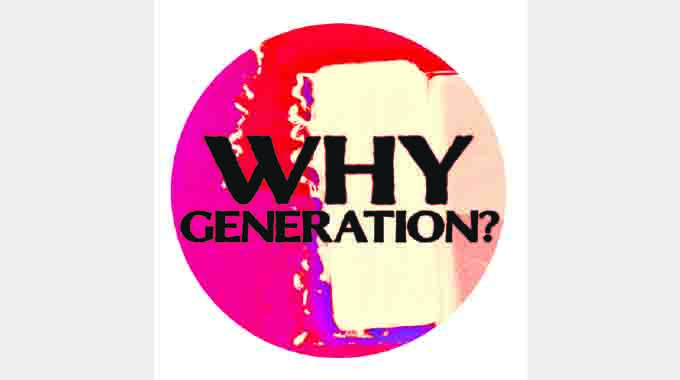When the word ‘why’ is used more than before

Fadzai Maposah-Correspondent
I love the Zimbabwean languages and culture. It is rich and loaded with idioms and proverbs that add value to the language. Come to think of it, there are many words that describe how one should behave or carry themselves.
I do not like boils. I never have. Growing up, I used to see people at the receiving end of home remedies to alleviate pain. Surprisingly despite the technological advances, some of the natural remedies have been passed down through the generations and have stood the test of time.
There were even ways that were considered appropriate for ‘maturing’ boils. ‘Maturing’ boils was a way to ensure that the pain would be quickly experienced and relief would follow the pain.
There is even a saying in Shona “kungogara pese semota”. Loosely translated this just means that someone sits anywhere and anyhow just like a boil.
Growing up I saw that saying come. Boils can be anywhere on the body. I have been told that the worst places for one to have a boil are the armpits and on the bums. I remember relatives and friends walking in a strange manner after a “boil” had decided to just land on the back.
When we were being cautioned about walking properly as children we were told “usafamba semunhu ane mota” (do not walk like one with a boil). So when walking, one had to be careful and also there was due attention and care when sitting.
Then the adults who knew that the young ones were scared of the pain that came with having a boil had something else to keep the young ones in check.
The older people had another statement that they would loosely say. The saying was “usagara munzira , ukagara munzira unoita mamota” – do not sit on the road, if you sit on the road you will have boils. The warning if heeded was enough to give one solace that they would not have pains that accompanied boils.
Whether the connection between where one sat or sits and having boils, is actually true, or whether it is false, all I am sure of is that, that statement kept many young people away from the roads as they feared boils.
That was then. Now say that to the young children of today and the questions will start. No, actually one word will be repeated over and over again, why, why, why. Then next would be “Please explain the connection between sitting by the road and having a boil?”
Young people need answers and they need them quickly. Now with the help of Google, they can just type – what causes boils and then relax as they wait for the answers to appear.
When the answers appear, one can then go through the available options and get as much information as possible.
I have had an experience where the young person then confronts the adult with the information from Google…..
Our grandparents and their parents before them knew the nature of humans. Besides not giving the additional information, older people used to instil fear in the younger ones.
I have realised that besides the older generation not having studied any psychology, they used a lot of it when dealing with the younger generation.
People at times are selfish. They do things that benefit them. Some people even have the tendency to ask and look for the benefits in anything before they actually get to do something.
The older generation had discovered that it is easier to get one to do something only if that individual believes there will be benefits.
The boils story shared above reflects that humans seek benefits in everything or maybe in most things that they undertake.
The reason that some people would stay away from the road as young people was to save themselves from “boil pain”. While the young people benefited by not having experienced pain, the older people’s workload was reduced as mischief was confined to the homestead as the children steered clear from the roads!
Hygiene has always been of paramount importance to our community as Zimbabweans. Even without knowing which bacteria or which germs caused which diseases, our grandparents and those before them knew that poor hygiene would affect the quality of life.
Understanding that although the “it”experience was very natural, our grandparents and their predecessors knew that people had to have guidelines in terms of the way they conducted themselves when they were on the ‘it’ experience.
To guard against poor disposal of the “it” experience equipment, some grandmothers and aunts would tell their female relatives that if someone was to see their ‘it’ experience blood, they could be bewitched!
Being bewitched is rather scary. Worse when one is told that it could be difficult to remove the spell that the witches would have cast.
And in the Shona culture it would mean that when seeking to remove a spell, other family members would be involved. What was most likely to happen was that when the family sought a traditional healer’s assistance, what had brought about the spell would be made public.
I was thinking of how hygienic it all was in the past, with proper disposal of ‘it’ experience equipment. It was rare to see soiled sanitary ware on the streets. Now, there are soiled diapers and sanitary ware thrown everywhere, some of them uncovered, totally unhygienic.
Walking behind two elderly woman who observed ‘it’ experience equipment and other garbage badly disposed of in a maize field, I heard one ask “ Today’s girls are not afraid of being bewitched?”. The other shook her head and then said “ Today they will just ask why should they do what you tell them”.
Have we just become a “why” generation . . .









Comments